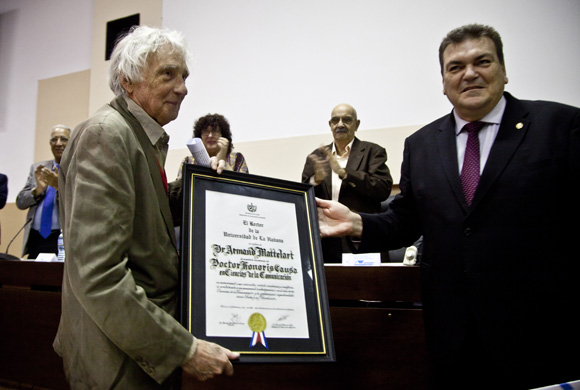By Atilio Borón
Last Friday (November 7th), Armand Mattelart, undoubtedly one of the leading scholars on mass communication and the media that disseminate it, passed away in Paris at the age of 89.
Armando graduated in Law and Social Sciences from the Catholic University of Leuven (Belgium) in 1960, but almost immediately moved to Paris and earned a diploma in Demography from the Sorbonne.
In 1963, he arrived in Chile as a professor at the Catholic University, where he authored several books on Chilean society, particularly on social integration, the demographic dynamics underlying urbanization processes, and their impact on politics, youth, and women in that country.
In 1965, he published the Social Atlas of the Communes of Chile, a pioneering work that compiled and analyzed socioeconomic and census data from Chile’s communes (around 300), opening the possibility of an in-depth analysis of the social bases of the political forces vying for power in the lead-up to the 1970 presidential election.
It was the wealth of information in this report that, as a student at FLACSO, allowed me to write a master’s thesis demonstrating that a victory for the left in the upcoming election was not only possible but also, under certain conditions, probable. Within the context of the great political mobilization that marked Chile in the second half of the 1960s, Mattelart, a refined observer of the realities of his time, redefined his research agenda, establishing the theme of the cultural domination of imperialism, ideology, and social communication as the central focus of his concerns.
His contributions broke with the rigid economism that then characterized the Latin American left and offered concrete empirical support for the initial reflections on cultural and ideological hegemony that arose from the arrival of Gramscian thought in our region.
As early as 1968, Mattelart was immersed in a study of the nefarious role that the newspaper El Mercurio and its radio and television affiliates played in Chilean political life, spreading all kinds of lies and fake news to the Chilean masses with the aim of confusing, demoralizing, and demobilizing them.
Once Allende was elected president, the media oligopoly that held sway in Chile intensified its attacks against the Popular Unity government and its president.
Half a century later, the reasons for such animosity came to light: declassified CIA documents revealed that El Mercurio and its director, Agustín Edwards Eastman, were mere operatives of “the agency” who relentlessly attacked the Popular Unity government and then obscenely praised the Pinochet regime in exchange for the large sums of money with which the CIA rewarded their “democratic zeal” for many years.
In response to these ferocious attacks by the media hitmen, Mattelart published two books in 1971: Mass Communication and Socialist Revolution, a hefty volume of over 300 pages co-authored with Patricio Biedma, a young Argentine student and member of the MIR in Chile, and his comrade-in-arms, Santiago Funes.
This book, written a couple of years before its delayed publication, would serve as the prologue to his celebrated How to Read Donald Duck, co-authored with Ariel Dorfman. According to its authors, it was conceived as a “manual of cultural and ideological decolonization” that unveiled the seemingly innocent content of Walt Disney’s work and exposed its subtle glorification of capitalism with its intelligent millionaires, Scrooge McDuck, Donald as the worker without the slightest hint of class consciousness, and Margaret as the hyper-consumerist woman in a society where anyone can be a millionaire.
This work, also published in 1971, is an illustrious precursor to cultural studies and decolonial currents that, amidst great resistance from dominant academic thought, have carved out a place for themselves in Latin American and Caribbean social sciences.
Today, more than fifty years after its publication, that book retains an astonishing relevance; it is an essential resource for understanding the renewed importance of ideological domination, amplified to the extreme by the development of information technology and the misnamed “social networks,” which are in reality devices that foster individualism, anti-politics, and resignation in the face of a status quo characterized by an incurable and growing social injustice.
We would not be exaggerating in the slightest if we said that all of Mattelart’s subsequent work, much of it written in collaboration with Michele, his lifelong partner, is a valuable repository of studies and reflections on the role of mass media in creating a subliminally conservative “common sense” that instills the idea that capitalism is the final stage in the historical evolution of humanity and that, consequently, any attempt to combat it is not only destined to fail but also opens the door to monstrous sociopolitical and economic realities. A tremendous contribution to understanding contemporary capitalism and its soft power strategies.
Onward to victory, always, dear Armand! You sowed awareness and knowledge, and your work was not in vain.
IMAGE CREDIT: Armand Mattelart receives an honorary doctorate from the University of Havana, presented by the then-rector, Dr. Gustavo Cobreiro. Photo: Cubadebate/Ismael Francisco.
[ SOURCE: CUBA DEBATE ]

